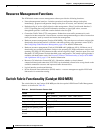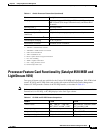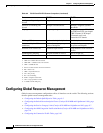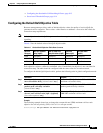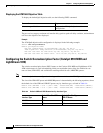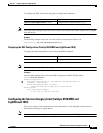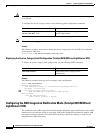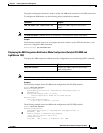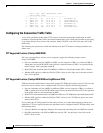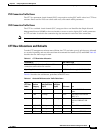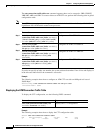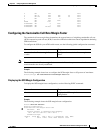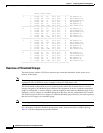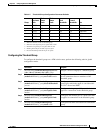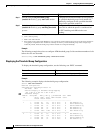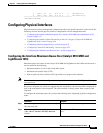
9-10
ATM Switch Router Software Configuration Guide
OL-7396-01
Chapter 9 Configuring Resource Management
Configuring Global Resource Management
cells limit limit Mark Discard count
instal instal instal
---------------------------------------------------
1 65535 63 63 25 % 87 % 0 cbr-default-tg
2 65535 127 127 25 % 87 % 0 vbrrt-default-tg
3 65535 511 31 25 % 87 % 0 vbrnrt-default-tg
4 65535 511 31 25 % 87 % 0 abr-default-tg
5 65535 511 31 25 % 87 % 0 ubr-default-tg
6 65535 1023 1023 25 % 87 % 0 well-known-vc-tg
Configuring the Connection Traffic Table
A row in the connection traffic table (CTT) must be created for each unique combination of traffic
parameters. Virtual path links (VPLs) and virtual channel links (VCLs) then specify traffic by specifying
a row in the table per flow (receive and transmit). Many VCL/VPLs can refer to the same row in the
traffic table.
The following two subsections outline the differences in the CTT feature according to platform and
feature card.
CTT Supported Features (Catalyst 8540 MSR)
The rows corresponding to various service categories support the following features on the
Catalyst 8540 MSR.
• Non-zero minimum cell rate (MCR) for UBR+ service categories. UBR+ is a variant of UBR, in
which peak cell rate (PCR), MCR, and cell delay variation tolerance (CDVT) are specified in the
traffic contract, with a guarantee on MCR.
• Both CDVT and maximum burst size (MBS) for VBR rows. Dual-leaky-bucket UPC is allowed.
• Whether SCR applies to either the CLP0 or CLP0+1 flow of cells. Only one or the other of these
flows can be policed.
CTT Supported Features (Catalyst 8510 MSR and LightStream 1010)
ATM switch routers with feature card per-flow queuing (FC-PFQ) and software version 11.2(8) or later
have more rows of various service categories that allow you to specify the following features:
• Non-zero minimum cell rate (MCR) for ABR and UBR+ service categories. UBR+ is a variant of
UBR, in which peak cell rate (PCR), MCR, and cell delay variation tolerance (CDVT) are specified
in the traffic contract, with a guarantee on MCR.
• Both CDVT and maximum burst size (MBS) for VBR rows. FC-PFQ allows dual-leaky-bucket UPC.
• Whether SCR applies to either the CLP0 or CLP0+1 flow of cells. FC-PFQ can police one or the
other of these flows.
If your switch has FC-PCQ installed on the route processor you cannot take advantage of these new
capabilities. CTT rows specifying these new parameters can be configured with FC-PCQ installed, with
the following effect:
• Non-zero MCR is not supported. Requests for connections specifying non-zero MCR are rejected.
• On VBR connections, only SCR and MBS are used for UPC, and policing is done only on the
CLP0+1 flow of cells.



